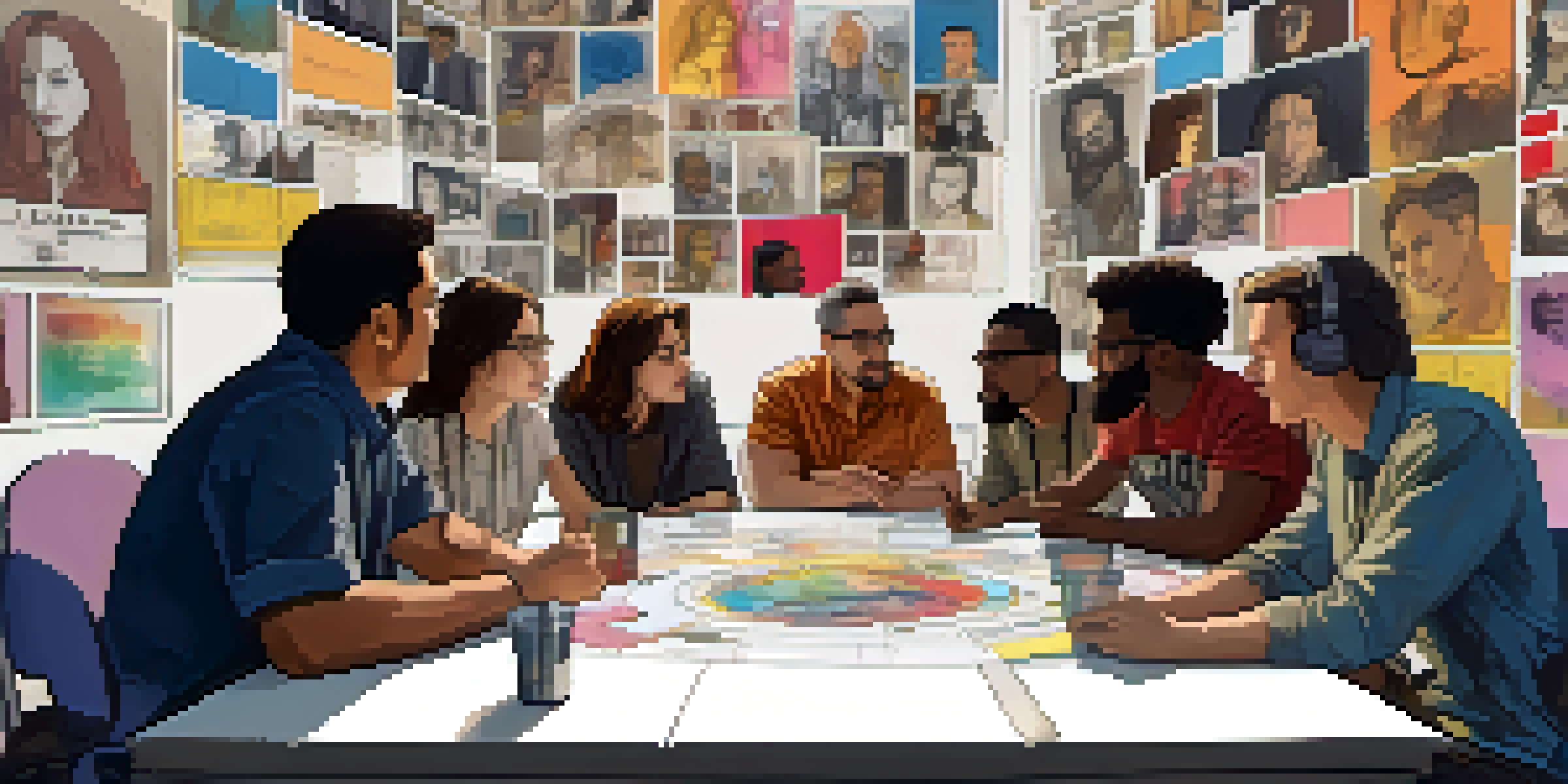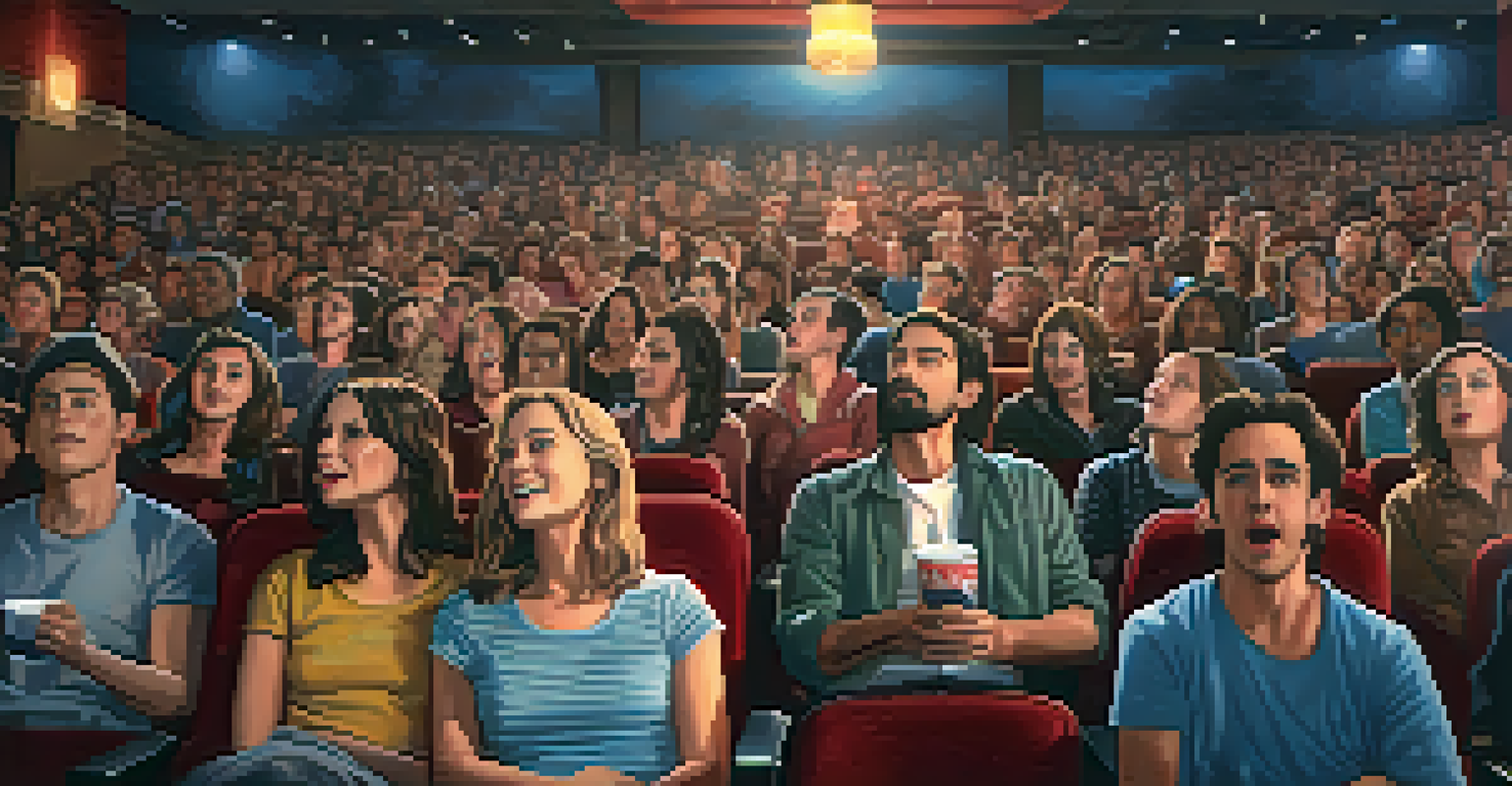Social Movements: Their Role in Shaping Hollywood Narratives

Understanding Social Movements and Their Impact
Social movements are collective efforts by groups of people to foster change or address social issues. They often arise from a shared concern, such as civil rights, gender equality, or environmental justice. These movements can significantly impact public opinion and policy, but their influence isn't limited to politics; they also shape cultural narratives, especially in Hollywood.
Movies are a form of social commentary, reflecting our culture and challenging our beliefs.
In Hollywood, narratives are often a reflection of societal values and challenges. As social movements begin to gain traction, filmmakers and writers take notice, incorporating these themes into their stories. This melding of social change and storytelling creates a dialogue between the audience and the issues at hand, making films not just entertainment, but also vehicles for awareness and change.
For example, the rise of the #MeToo movement has prompted filmmakers to rethink how they portray women and gender dynamics on screen. This shift has led to a surge in stories that not only highlight women's experiences but also challenge traditional narratives, showcasing the power of social movements in reshaping Hollywood.
Historical Context: Cinema and Social Change
Looking back, cinema has always been intertwined with social movements. From the civil rights era films that spotlighted racial injustice to the anti-war movies of the 1970s, Hollywood has often mirrored the social struggles of its time. These films serve as both a reflection and a catalyst for change, influencing public perception and inspiring activism.

For instance, movies like 'Guess Who's Coming to Dinner' challenged racial stereotypes and sparked conversations around interracial relationships. Such films didn't just entertain; they provoked thought and encouraged audiences to question societal norms. This historical context shows how deeply rooted the connection between cinema and social movements is.
Social Movements Shape Hollywood
Collective efforts for social change influence film narratives, making them platforms for awareness and dialogue.
As we move into contemporary times, it's clear that filmmakers continue to draw inspiration from the societal landscape. The historical understanding of cinema's role in social change provides a crucial backdrop to analyze current trends in Hollywood storytelling.
Representation Matters: Voices That Were Silenced
One of the most significant impacts of social movements on Hollywood is the push for increased representation. Historically, marginalized communities have often been overlooked or misrepresented in film. Social movements advocate for these voices, pushing for authentic storytelling that resonates with diverse audiences.
Cinema is a mirror by which we often see ourselves.
The rise of movements like Black Lives Matter and LGBTQ+ rights has challenged Hollywood to rethink its casting, storytelling, and production practices. As a result, we've seen a surge in films that center on the experiences of these communities, showcasing their struggles and triumphs in a way that feels genuine and relatable.
A great example of this shift is the film 'Moonlight,' which tells the story of a young Black man grappling with his identity and sexuality. It won an Academy Award for Best Picture, highlighting how powerful representation can be when social movements pave the way for authentic narratives.
The Role of Activists and Filmmakers Together
The collaboration between activists and filmmakers is crucial in shaping narratives that reflect social movements. Activists often provide insights and real-life stories that filmmakers can adapt into compelling narratives. This partnership ensures that the stories being told are not only entertaining but also rooted in reality.
For instance, documentaries like '13th' directed by Ava DuVernay showcase the intersection of race and the justice system, sparking discussions about systemic racism. These films are products of a collaborative effort between passionate activists and skilled storytellers aiming to educate and motivate audiences.
Increased Representation in Film
Movements like Black Lives Matter and LGBTQ+ rights advocate for authentic storytelling that highlights diverse experiences.
When filmmakers take the time to listen and learn from those directly affected by social issues, the resulting narratives can create a lasting impact. This synergy between activism and filmmaking enriches the storytelling landscape in Hollywood.
Changing Genres: From Documentaries to Dramas
Social movements have influenced not only the themes of Hollywood films but also the genres being explored. Documentaries have gained popularity as a means to tell real-life stories, providing a platform for voices that may otherwise remain unheard. This shift reflects a growing audience demand for content that addresses pressing social issues.
Dramatic films, too, are evolving to incorporate elements of social commentary. Genres that were once primarily focused on entertainment are now embracing narratives that provoke thought and inspire change. This blending of genres allows filmmakers to approach serious topics in a way that resonates with audiences.
For example, the film 'The Hate U Give' tackles themes of racial injustice and police violence through a coming-of-age story. By weaving social issues into familiar genres, filmmakers can engage viewers while shining a light on important matters, showcasing the versatility of storytelling in Hollywood.
Audience Reception: Engaging with Social Narratives
The audience's role in shaping Hollywood narratives is just as important as that of the filmmakers. As social movements gain momentum, audiences become more discerning, seeking out films that reflect their values and beliefs. This shift in consumer behavior has prompted studios to invest in stories that resonate with viewers on a deeper level.
Social media platforms have amplified audience voices, allowing them to share their thoughts and opinions on films and their representations of social issues. This immediate feedback loop encourages filmmakers to be more mindful of how they portray sensitive topics, knowing that audiences are paying close attention.
Collaboration Drives Impactful Narratives
The partnership between activists and filmmakers enriches storytelling, ensuring narratives are rooted in real-life experiences.
Films that successfully engage with social narratives often receive critical acclaim and box office success. As audiences continue to advocate for more authentic and diverse storytelling, Hollywood must adapt and evolve to meet these expectations, creating a more inclusive cinematic landscape.
The Future of Hollywood: Sustainability and Activism
As social movements continue to shape Hollywood, the future looks promising for more inclusive and socially conscious narratives. Filmmakers are increasingly recognizing their responsibility to address social issues and contribute positively to public discourse. This trend suggests a shift towards sustainability in storytelling, where filmmakers prioritize ethical considerations.
The rise of climate activism has also made its way into Hollywood narratives, with filmmakers exploring themes of environmental justice and sustainability. Movies that address climate change not only entertain but also educate audiences about pressing global challenges.

As we look to the future, the integration of social movements into Hollywood will likely continue to evolve. With a growing emphasis on collaboration and authenticity, filmmakers have the opportunity to craft narratives that not only entertain but also inspire action and foster change in society.